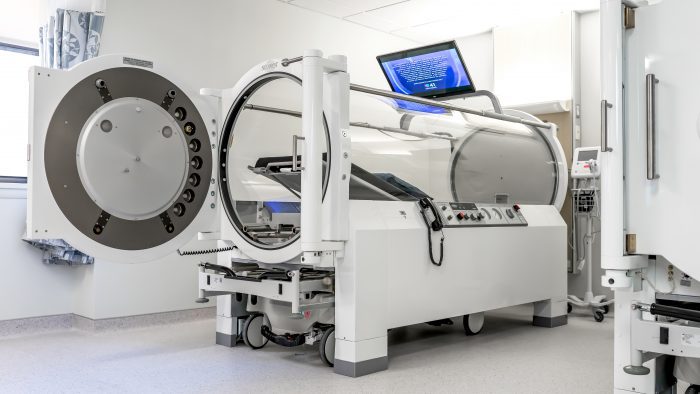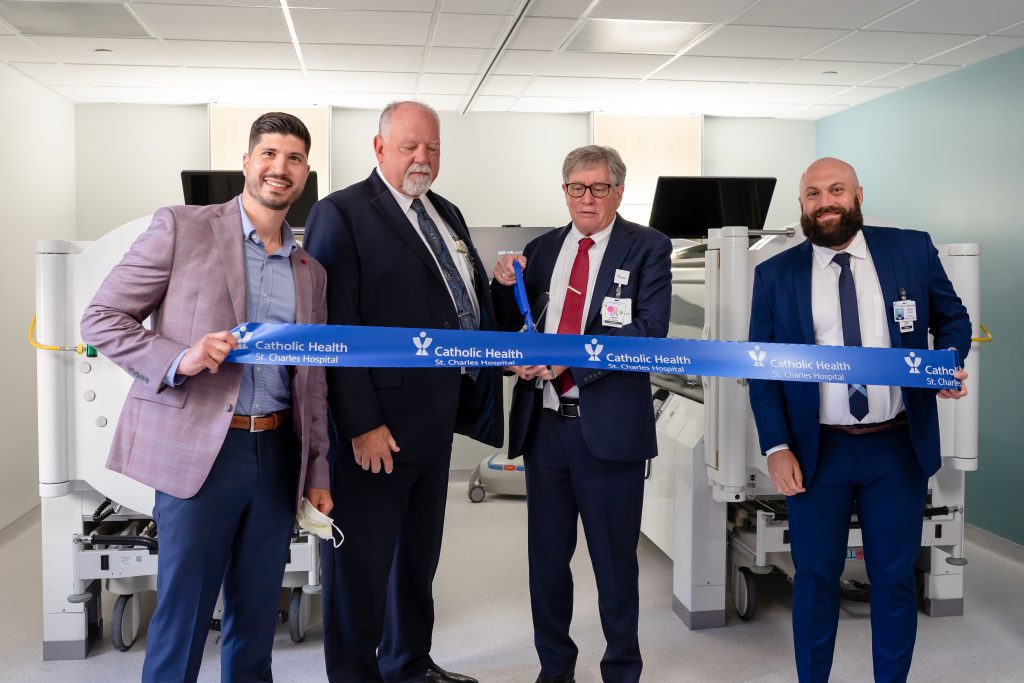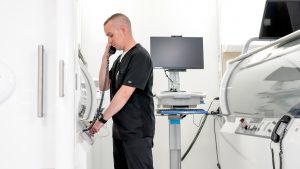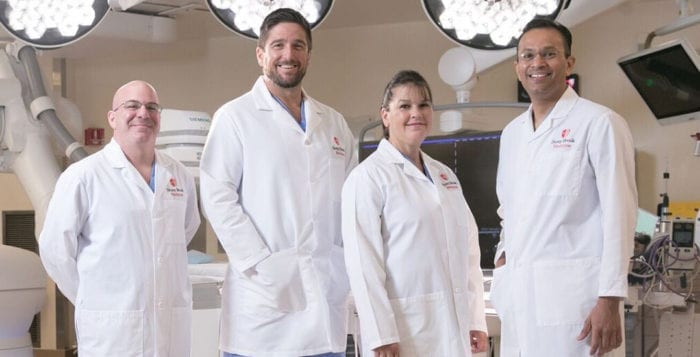Stony Brook University Hospital (SBUH), Stony Brook Children’s Hospital, Stony Brook Southampton Hospital (SBSH) and Stony Brook Eastern Long Island Hospital (SBELIH) have been named “LGBTQ+ Healthcare Equality Leaders” for 2024 in the Human Rights Campaign Foundation’s Healthcare Equality Index (HEI). All hospitals received the top score of 100 on a survey encompassing non-discrimination and staff training, patient services and support, employee benefits and policies, and patient and community engagement.
“We are honored to be recognized as LGBTQ+ Healthcare Equality Leaders by the Human Rights Campaign Foundation’s Healthcare Equality Index,” said William A. Wertheim, MD, MBA, Interim Executive Vice President for Stony Brook Medicine. “This recognition reaffirms our unwavering commitment to providing inclusive and equitable care to all individuals, regardless of sexual orientation, gender identity or expression. We stand as advocates for diversity, champions for equality and partners in health for every member of our community.”
Stony Brook Medicine continues to grow its dynamic LGBTQ+ Committee, amongst all of its hospitals, to address the needs of the LGBTQ+ community, including patients, faculty, staff and trainees. The Stony Brook Medicine LGBTQ+ Committee is co-chaired by three SBUH-affiliated colleagues: Rose Cardin, MSN, RN, Director, Patient Education, Stony Brook University Hospital; Allison Eliscu, MD, FAAP, Chief, Adolescent Medicine, Stony Brook Children’s Hospital; and Adam Gonzalez, PhD, Vice Chair, Behavioral Health, Stony Brook Medicine. The multidisciplinary group is made up of medical and behavioral health providers and trainees, nurses, students, education specialists, and representatives from Human Resources, Information Technology and hospital administration. Its mission is to review, address and affirm the specific and unique needs of LGBTQ+ individuals, as well as promote respectful and culturally sensitive care to the LGBTQ+ community.
Each year SBUH seeks new ways to address and affirm the specific and unique needs of LGBTQ+ individuals. In 2023, SBUH updated their electronic medical record to add pronouns to the banner bar, so they are front and center for healthcare workers. Pronouns are words used to refer to either the person who is talking (like “I” or “you”) or a person being talked about in the third person (like “she/her,” “he/him,” and “they/them”). “They/Them” are common gender neutral pronouns. Being intentional about using someone’s pronouns is a simple way to show respect. Another accomplishment in 2023, SBUH scholars published results from Stony Brook Medicine’s LGBTQ+ Health Needs Assessment Survey, a collaborative effort in 2021 involving over 30 Long Island-based organizations and community leaders. Survey results are being utilized to guide our health system’s efforts to address health equity for the LGBTQ+ community.
A core mission for SBUH is fostering health equity for both its patients and staff. This past February, Stony Brook University Hospital was among the first eight hospitals in the United States to attain the Health Care Equity Certification from The Joint Commission and the only awarded organization on Long Island. Recognition was given to SBUH for implementing exemplary practices, such as employing health equity screening and data collection tools, documenting social work effectively, and making accommodations to meet the needs of patients with disabilities, among other activities.
“This recognition is a testament to the meaningful work carried out at Stony Brook University Hospital each day in support of the LGBTQ+ community on Long Island,” said Carol A. Gomes, chief executive officer for Stony Brook University Hospital. “For decades, our healthcare system has developed programs and offered services to help patients access the highest quality of care, and we want to continue to build on that strong foundation.”
Stony Brook Southampton Hospital’s Rose Walton Care Services has administered HIV prevention and care since the 1990s. In 2021, the hospital expanded services to include LGBTQ+ healthcare and opened the Edie Windsor Healthcare Center in Hampton Bays. The practice has a dedicated, full-time physician, Dr. Eric Lella, and provides confidential medical services in an accessible and caring environment, affirming all sexual orientations and gender identities and expression.
In 2023, SBSH implemented a LGBTQ+ Health Equity and Education Initiative program focusing on further educating staff in LGBTQ+ health care services, needs and protocols, including pronoun identification. The Edie Windsor Healthcare Center (through a NYSDOH AIDS Institute subcontract with PFY™) expanded mental health services and case management services, and the Center introduced patient navigation services to assist with insurance enrollment and access to entitlements/benefits, medical and other supportive services. The Center continues to administer mpox vaccinations to those who have been exposed to mpox or are at risk.
“The HEI Leadership designation recognizes our unyielding commitment to educate our staff in providing high-level LGBTQ+ healthcare with respect,” said Fredric I. Weinbaum, MD, CMO, COO and Interim CAO, Stony Brook Southampton Hospital. “As well as our efforts to provide LGBTQ+ patients with access to resources, programs and services.”
Stony Brook Southampton’s Hospital’s Diversity, Equity, and Inclusion Leadership Council, a committee of 25 administrators, physicians, nurses, and other staff, actively educates, informs, and provides resources for the wider hospital community about diversity issues while seeking opportunities to build an inclusive and safe environment for all who work in, seek care at, or visit the hospital’s facilities. To foster a sense of inclusion and compassion for all, the hospital has provided training to staff through the Responding to Equity, Diversity and Inclusion (REDI) program and the Greater New York Hospital Association’s Cultural Competency and Health Literacy education programs.
Upon reviewing HEI recommendations and criteria to better understand the behavioral health and medical needs of its local LGBTQ+ community, SBELIH revised human resource and hospital-wide policies, employee documents, terminology in medical records and facility signage. The changes enhanced SBELIH’s already strong focus on providing non-discriminatory and compassionate care. With a long history of serving the LGBTQ+ community, SBELIH continues to add clinicians and other staff members who specialize in LGBTQ+ care. The hospital’s history of service contributed to HEI naming SBELIH a Leader in LGBTQ Healthcare Equality.
SBELIH proudly participated in several initiatives promoting LGBTQ health equality. In June 2023, we joined the Greenport Pride Parade, demonstrating Stony Brook’s commitment to inclusivity and diversity. Collaborating with SBSH Edie Windsor Healthcare Center, SBELIH presented “LGTBQ* and Healthcare: Empowering Health, Embracing Diversity, in Southold NY,” underscoring the importance of LGBTQ-inclusive healthcare practices.
Additionally, SBELIH took part in “Queer Pride & Progress” by QUEERLI, in Jamesport NY, an event emphasizing inclusivity and understanding. Discussions covered a range of topics, including gender and sexuality, pronoun usage, and fostering a culture of care. SBELIH’s Chief Nursing Officer Suzie Marriott provided impactful contributions to these conversations.
“Ensuring health equity for all, regardless of sexual orientation or gender identity, is not just a moral imperative but a fundamental aspect of our commitment to compassionate care and inclusivity,” said Paul Connor, Chief Administrative Officer of Stony Brook Eastern Long Island Hospital. “Let’s continue to educate ourselves, engage in positive dialogue, and respect each other’s identities. Together, we can cultivate a world where everyone feels accepted and valued.”
The Human Rights Campaign Foundation is the educational arm of America’s largest civil rights organization working to achieve equality for lesbian, gay, bisexual, transgender and queer people. HRC envisions a world where LGBTQ+ people are embraced as full members of society at home, at work and in every community.
Stony Brook Medicine offers a range of specialized LGBTQ+ health services including a Talking About Gender (TAG) support group for teens to explore gender identity and expression, and a free educational support group for Parents of Transgender and Gender Diverse Children. For more information on Stony Brook Medicine’s LGBTQ+ care, visit:stonybrookmedicine.edu/LGBTQ.












